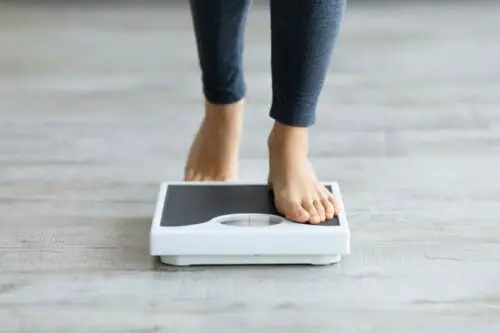‘Water weight’ is a term that is often thrown around when discussing weight loss. However, many need help understanding what the term means or how it affects the number you see on the scale. What exactly does it suggest, and how does it impact our weight loss journey? Let’s dive into water weight’s nuances, its causes, management strategies, and its role in weight loss.
Understanding The Effect of Water Weight
Nearly every aspect of your body needs water to function in one way or another. The human body is approximately 60% water, with this vital fluid playing various roles, including waste removal, temperature regulation, and joint lubrication.
When we talk about ‘water weight,’ we refer to the excess water stored in the body. Your diet, hormonal changes, and level of physical activity are a few factors that can affect this. It’s crucial to understand these factors to manage water weight effectively.

The Common Causes of Water Weight Gain
The delicate fluid balance of the body is susceptible to several factors.
High-Sodium Diet
Sodium has a knack for holding onto water. Taking in excessive amounts of sodium can cause your body to retain water to compensate for the disproportionate increase in salt. This retention leads to water weight gain. Frequently, a diet rich in processed and convenience foods can inadvertently increase your sodium intake far beyond the recommended levels.
Carbohydrate Consumption
The relationship between carbohydrates and water weight lies in glycogen. When you consume carbohydrates, your body converts some into glycogen for immediate energy use and stores the rest in your muscles and liver for later use. Each gram of glycogen holds about 3–4 grams of water. Thus, if your diet is heavy in carbohydrates, you may notice increased water weight due to the additional water stored in glycogen.
Hormonal Influences
Hormones play a significant role in water retention. Women, in particular, may experience changes in water weight throughout their menstrual cycle due to hormonal fluctuations. Certain hormones signal your body to retain more sodium and, as a result, more water.
Dehydration
Paradoxically, not consuming enough water can lead to water retention. When your body doesn’t get the water it needs, it resorts to survival mode, holding onto whatever water it has to prevent severe dehydration.
Understanding and Managing Fluid Balance
Water weight is a critical element when understanding the intricacies of weight loss. Managing fluid balance is possible by combining dietary modifications, hydration, and physical activity.
Hydration
Paradoxically, adequate hydration can help you lose weight. Drinking more water when trying to lose weight may seem counterintuitive, but the body may retain water if it does not receive enough as a survival mechanism. By consuming adequate fluids, you encourage your body to release stored water that isn’t necessary for possible shortages.
Physical Activity
Getting the right amount of exercise can help manage water weight. Firstly, it encourages the body to move water into your muscles, promoting a healthy fluid balance. Secondly, sweating during a workout helps the body rid itself of excess sodium and water.
A regular, well-rounded exercise routine that includes cardiovascular activities, strength training, and flexibility exercises can support healthy water balance and weight management.
Dietary Modifications
One of the first steps toward managing water weight is dietary modification. A diet high in sodium can lead to water retention as the body tries to maintain its electrolyte balance.
To prevent this, opt for a balanced diet with moderate sodium levels.
Fresh, unprocessed foods are typically lower in sodium and a healthier choice.
Carbohydrates are another dietary component to monitor. When consumed, carbs are stored in the muscles and liver as glycogen, an energy reserve for the body.
However, each gram of glycogen also holds around three grams of water. Choosing complex carbohydrates over simple ones can help manage this, as they slowly digest, preventing sudden surges in glycogen and associated water storage.
The Water Weight and Weight Loss Connection
Appreciating the role of water weight is integral to effective weight management and setting realistic expectations on your weight loss journey. It’s crucial to differentiate between the loss of water weight and the loss of body fat, two very different physiological processes.
Initial rapid weight loss, often seen at the commencement of many diets, is typically a reduction in water weight rather than fat loss. While seeing quick results might provide an initial morale boost, it’s important not to confuse this with long-term, sustainable weight loss, primarily about shedding body fat.
Knowing how to control your water weight can help you reduce the stress that comes from unneeded weight fluctuations on the scale and give you a better understanding of your actual weight loss progress. It’s important to remember that while managing water weight is a part of the weight loss journey, achieving lasting health benefits and physical changes is tied to losing fat. Incorporating sustainable dietary habits, regular physical activity, and adequate hydration into your lifestyle is critically important.
Many searching for an additional boost to their weight loss efforts have discovered the modern approach in the form of medical weight loss treatments. One prevalent option created to encourage long-term weight loss is Wegovy weight loss injections. These in-home, self-injectable medications are a valuable and efficient method to assist in your weight loss journey, delivered right to your door.
Palm Springs Wegovy is an in-home medical weight loss treatment, virtual consultation, and prescriptions delivered to your home or other convenient location. Those curious to see if this dynamic treatment is proper for them can further discuss the process with a quick call or a simple click of a button.
Final Thoughts
Understanding water weight is a fundamental part of the weight loss journey. It’s a complex interplay of diet, hormones, and hydration levels. While it’s normal for body weight to fluctuate due to changes in water weight, focusing on long-term strategies for fat loss is vital to sustainable weight management.
References:
- https://blog.nasm.org/how-to-lose-water-weight-effectively
- https://www.ncbi.nlm.nih.gov/pmc/articles/PMC4121911/
- https://www.mdpi.com/2072-6643/11/8/1923





